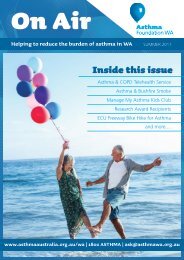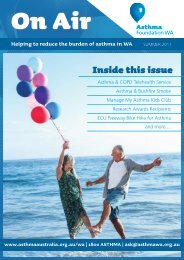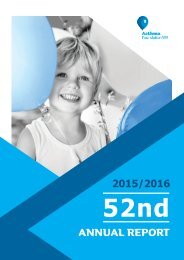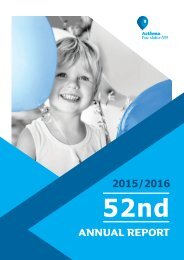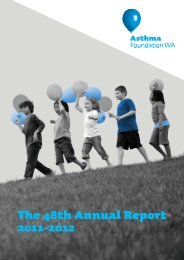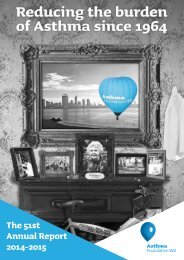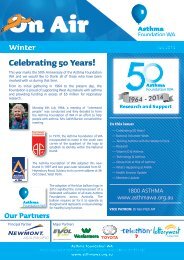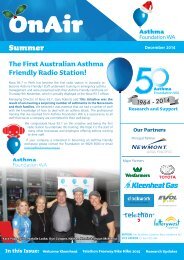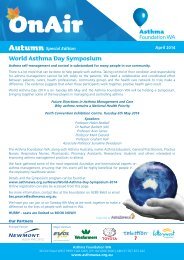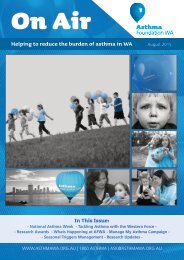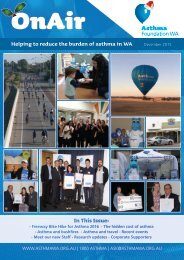OnAir Winter 2016
Asthma Foundation WA OnAir 2016
Asthma Foundation WA OnAir 2016
You also want an ePaper? Increase the reach of your titles
YUMPU automatically turns print PDFs into web optimized ePapers that Google loves.
Dr Svetlana Baltic, Senior Scientist,<br />
Molecular Genetics Unit at Harry<br />
Perkins Institute of Medical Research<br />
and MASAC member<br />
A LOCAL RESEARCH BREAKTHROUGH<br />
AFWA CONTRIBUTING TO LOCAL RESEARCH<br />
Dr Svetlana Baltic was awarded a Project Grant<br />
of $26,500 from Asthma Foundation WA (AFWA),<br />
as part of the research grants announced during<br />
National Asthma Week in September 2013, and<br />
the final report from her research has recently<br />
been published.<br />
Dr Baltic’s research was entitled “Aberrant<br />
alternative splicing defines the severity of<br />
asthma.”<br />
Dr Baltic explains, “We have always known that<br />
asthma had a link to the immune system, but until<br />
now, researchers haven’t understood exactly why the<br />
genes involved in the immune system act differently in<br />
people with asthma. Every human cell contains a full<br />
range of human genes. But those genes are expressed<br />
in different ways – or have different variations –<br />
depending on the type of cell.”<br />
The gene variants are produced by a process called<br />
“alternative splicing”. Alternatively spliced genes are a<br />
normal phenomenon – around 95% of all human genes<br />
are alternatively spliced. But sometimes in disease, the<br />
expression of these variations is abnormal, and the cells<br />
don’t function as they should.<br />
Dr Baltic noted, “in our studies so far, we have shown<br />
that there are different variants of genes expressed in<br />
people with asthma compared with people without<br />
asthma. This difference also determines whether a<br />
person has mild or severe asthma.”<br />
Dr Baltic continued, “We have also discovered that<br />
variants within two specific genes, known as SETD7<br />
and KDM6A can influence the function of the whole<br />
immune system, affecting hundreds of genes. This<br />
means that using gene therapy, we can now correct<br />
the expression of these variants, and actually change<br />
the expression of many of the genes that affect the<br />
function of the immune system. This could make a<br />
person with asthma’s condition less severe, or maybe<br />
cure their asthma all together.”<br />
This discovery marks the beginning of exciting new work<br />
on these gene variants. Dr Baltic’s research suggests<br />
that we need to understand the mechanisms of what<br />
regulates the ‘alternative splicing’ and expression of<br />
specific splice variants. This potentially means new<br />
treatments for people with asthma could be on the<br />
horizon.<br />
AFWA CEO David Johnson said, “Dr Baltic has<br />
recently joined AFWA’s Medical and Scientific Advisory<br />
Committee (MASAC) which is made up of clinicians,<br />
researchers and physicians who are all working at the<br />
forefront of respiratory research. We look forward to<br />
Dr Baltic’s input and experience to AFWA’s ongoing<br />
research funding and her gene research outcomes is<br />
very positive for asthmatics.”<br />
3




